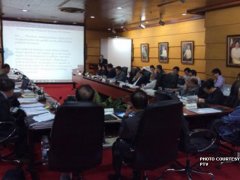
MANILA — The anti-dynasty provisions that the Consultative Committee (ConCom) wanted to be included in the proposed Charter change would address corruption, a ConCom member said.
In an interview, former De La Salle University Dean Julio Cabral Teehankee said the regulated ban on political dynasties would prevent elective officials from accumulating power and increase the accountability of public officials.
“The anti-dynasty provision is also part of strengthening the accountability of public officials because now they will not be able to accumulate political power and use that to perpetuate themselves to power,” said Teehankee, chairman of the ConCom subcommittee on political reforms.
Last Wednesday, the ConCom tasked by President Rodrigo R. Duterte to review the 1987 Constitution unanimously approved anti-dynasty provisions that, if adopted under the new Constitution, would make dynasties a thing of the past.
Under the proposed provisions, a political dynasty exists when a family — whose members are related up to the second degree of consanguinity or affinity – maintains political control by succession or by simultaneously running for or holding elective positions.
It covers relations that are legitimate, illegitimate, and half- or full-blood.
The provisions include barring second-degree relatives, such as spouse, children, children-in-law, brother and sisters, brother-in-law, sister-in-law, parents, parents-in-law, grandparents, and grandparents-in-law from succeeding each other in office and limiting the number of positions they could hold to two – national and one regional or local.
If adopted under the proposed federal state, two or more members of a political family cannot hold two regional or local positions at the same time.
Another provision empowers the future Congress to provide additional prohibitions.
ConCom chairman Reynato Puno said the self-executing anti-dynasty provisions are a prerequisite to federalism.
Puno said governments of the constituent units “must be a run on the basis of merits and not by reason of genetics.”
“With this kind of balancing and the other political reforms, we shall further install in our Constitution, I am confident that we shall soon be talking of the problem of political dynasties in the past tense,” said Puno, a former Chief Justice.
He said the people’s right to elect and to be elected should be preserved and not be taken away by the bad side of the political dynasties.
“Sovereignty resides in the people and all government authority emanates from them,” the former Chief Justice said.